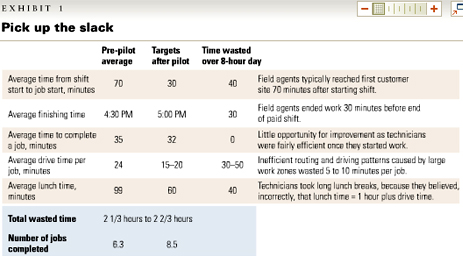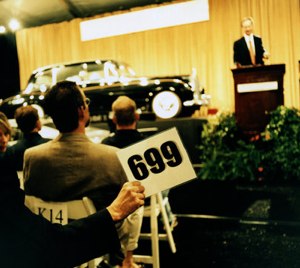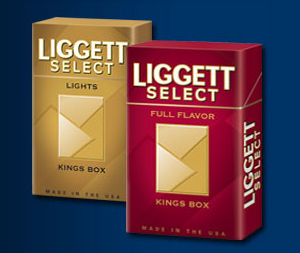CT scanning, a promising approach to detecting lung cancer at early, treatable stages, has been dealt a setback with the revelation that the most prominent study so far in support of it was funded almost entirely by a cigarette company—with the funds funneled through a foundation set up by the study’s author, Dr. Claudia Henschke, reports the New York Times. Although the funding revelation doesn’t negate the results of the study, it raises huge conflict of interest flags and reveals how a tobacco company secretly influenced professional opinion by funneling $3.6 million into the foundation over a three year period.
studies

New Report Says FCC Fails At Tracking Customer Complaints
The Government Accountability Office (GAO) released a new report yesterday that says that while the FCC processes about 95% of the complaints that come in, it takes some sort of enforcement action in only about 9% of them. “The GAO said it was unable to determine why the [other] investigations were closed without action because ‘FCC does not systematically collect these data.'” The FCC uses five separate databases and “about 46,000 paper files” to track complaints, and the GAO said “made it difficult to get answers to basic questions like how long it takes the agency to close an investigation and the total dollar amount it assesses in fines.”
../../../..//2008/03/11/for-the-retail-managers-lurking/
For the retail managers lurking here: an analysis of data from a “US specialty retailer” shows that not reducing staff during lean times leads to an increase in profit margins. [The Times South Africa]

Service Techs Waste 2.3 Hours Per Day When No One Is Watching
Probably the number one complaint we get from readers about cable and phone service is how the guys never show up when they’re supposed to, or even they day they’re supposed to. As roving lone tech support cowboys, is it a case of the mice will play when the cat’s away? Look at how much more efficient field agent service techs got when managers did ridealongs in this McKinsey study. The company was able to recover 2.3 hours of lost productivity and increase jobs per day completed from 6.3 to 8.5. Inside, how the company recovered even more lost productivity by implementing a new dispatch system capable of on-they-fly scheduling…

Consumers Behave Stupidly When Things Are "Free"
“Free” has a magic effect on people’s minds, according to research by Dan Ariely (whose new book, Predictably Irrational could become the Freakonomics of 2008). He did an experiment giving people a choice between a “high-value” and a “low-value” product, a Lindt’s chocolate and a Hershey’s, respectively, and nothing. When the price was set at 1 cent for the Hershey’s and 15 cents for the Lindts, 14% chose the Hershey’s and 36% chose the Lindt’s. What do you think happened when the price was reduced by one cent for both items?

Beware Dirty Lemon Wedges At Restaurants
The slightly alarmist HealthInspections.com has a story about dirty lemon wedges in restaurants—apparently they’re a “witch’s brew of bacteria,” to use the hilariously over-the-top language of the video narrator, who speaks in a parody of a newscaster voice. Our favorite trick of theirs: overlaying gigantic bacteria animations on everyday objects, as you can see in this screen capture. But anyway, the point is a microbiologist from New Jersey found various bacteria on three quarters of the lemons she tested from 21 different restaurants: “The very first sample that we took was loaded with fecal bacteria.”

Study Says Payday Lenders More Prevalent In Areas Of High Christian Conservative Power
A law professor and associate professor of geography set out to create the most comprehensive map of U.S. payday lenders to date. What they found, to their surprise, was “a surprising relationship between populations of Christian conservatives and the proliferation of payday lenders.” And it’s not a side effect of a poor population that happens to be Christian, according to the authors: “Our research showed that the correlation between payday lenders and the political power of conservative Christians was stronger than the correlation between payday lenders and the proportion of a population living below the poverty line.”

Study Links Speeding Tickets And Risky Trading
People who get a lot of speeding tickets also engage in risky investing behavior, according to a new study. Finnish researchers compared a speeding ticket database and a database of all the trading portfolios of Finnish households. Their findings suggest that for these speeders, a sensible long-term investment strategy simply isn’t interesting enough for them. They crave the thrill and excitement of churning over their investments more frequently. Each successive speeding ticket and investor received correlated to an 11 percent increase in their portfolio turnover. On average, the stocks they bought didn’t do any better than the ones they had just sold.

Survey Says: Half Of UK Men Would Give Up Sex For 50-Inch Plasma TV
A British electronics retailer asked 2,000 men and women what they’d give up in exchange for a 50″ plasma TV, and according to them, “47 percent of men would give up sex for half a year.” Among women, the number drops to about a third who are wiling to forgo sex. We’re not going to pretend for a second that this study is in any way scientific, but still—six months? Seriously?

Rise In Gout Blamed On Fructose In Soft Drinks
Gout sounds like something characters in Dickens novels get, but apparently it’s a modern affliction as well—at least in the U.S. where the number of cases has doubled in the past few decades. Now researchers are saying that “Men who consume two or more sugary soft drinks a day have an 85% higher risk of gout compared with those who drink less than one a month.”

Study Says Shoppers "Save" Money On eBay
EBay doesn’t share data on bidders’ maximum bid amounts, so it’s always been difficult to quantify whether or not buyers are actually saving money, but a new study has attempted to put hard numbers behind the transactions. The study’s authors use data from bidders who used a specific sniping agent—by measuring what those bidders were willing to pay versus actual winning amounts, they’ve determined that the average winning bid comes in about 30% lower than the maximum amount the buyer was willing to spend.

Expensive Flowers Are Better Than No Flowers On Valentine's Day
According to enterprising scientists, people buy last minute Valentine’s Day gifts to avoid a fight, rather than to express love—as any lazy lover can attest. The marketing researchers devised three experiments to prove that our susceptibility to negative advertising is directly impacted by how long we wait to whip out the wallet.
../../../..//2008/01/17/a-clinical-trial-of/
A clinical trial of Zetia, a popularly prescribed cholesterol-lowering drug, “failed to show that the drug has any medical benefits.” In fact, fatty plaques grew almost twice as fast in patients who took Zetia along with Zocor in a combo product called Vytorin. However, “patients who are taking Vytorin or Zetia should talk to their doctors if they are concerned and not discontinue taking the medicines on their own.” [New York Times]

Hormone-Filled Dietary Supplement Caused Cancer In Two Men, Say Doctors
A new article published today in Clinical Cancer Research says that two men “developed aggressive and incurable prostate cancer within months of taking the same supplement.” The doctors examined the supplement and discovered it contained testosterone and estradiol, and “when they tested it on tumor cells in the lab, they found it fueled the growth of prostate cancer cells more potently than testosterone alone.” Either don’t take herbal/hormonal dietary supplements, they urge, or make sure you fully disclose to your doctor what you’re taking.

Study: People Who Buy Contacts Online More Likely To Take Poorer Care Of Their Eyes
The FDA has a set of specifications on proper eye care, and apparently people who buy their contact lenses online are less likely to follow those rules, reports a new study. The gap comes from having less trained, in-person medical attention and up-to-date prescriptions, and not poorer cleaning habits (although we wouldn’t recommend using dollar store saline solution just to save a few bucks).
Drug Companies Spend Almost $60 Billion On Marketing, $30 Billion On Research. What?
It’s okay for drug companies to spend oodles on advertising because they spend even more making sure their drugs are safe and effective, right? Not so much, according to a study in PLOS Medicine.




